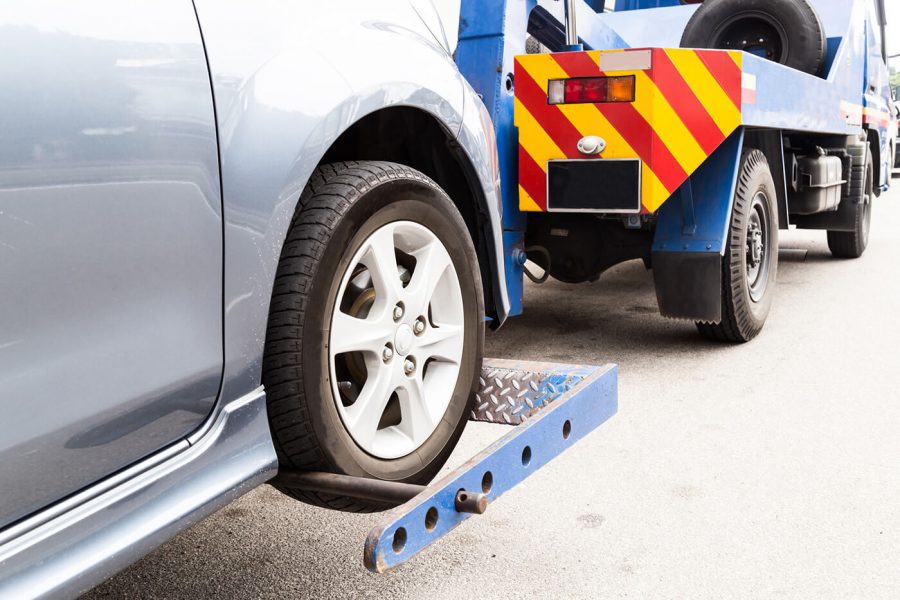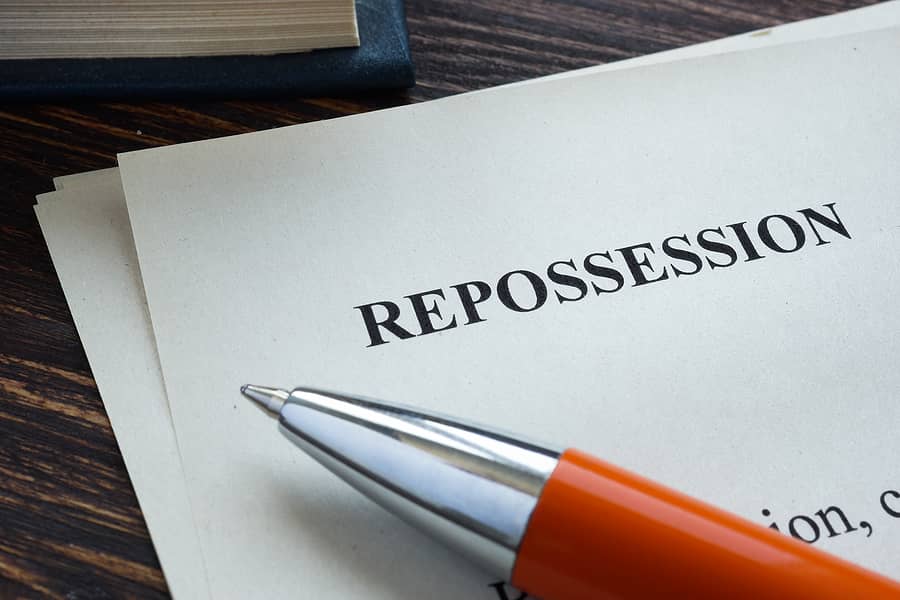Ontario law states that a lender may repossess your car if you miss two consecutive payments. However, before they can do this, the lender must give you written notice of their intention to repossess the vehicle and offer an opportunity for payment or other arrangements to be made with them.
It is crucial to understand that in Ontario, lenders are not allowed to take any action against you personally when it comes to recovering outstanding debt on a loan secured by a motor vehicle. If no such arrangement is established, then the lender may legally take your automobile away from you.

How Does Car Repossession Work in Ontario?
In Ontario, car repossession is a legal process whereby lenders can reclaim vehicles from borrowers who have failed to make payments on time or in full.
Generally speaking, it requires the lender to obtain a court order for repossession and then hire a bailiff or repo agent to seize the vehicle. The borrower must be given proper notice (typically via registered mail) informing them of their rights and that the vehicle is about to be seized unless payment arrangements are made.
Once seized, the car may be sold at auction or kept by the lender until all outstanding debt has been paid off. Borrowers should note that they may still owe money even after a repossession, as any remaining balance will need to be paid in full before they regain ownership of their car.
What is the Repossession Act Ontario?
The Repossession Act of Ontario is a law that allows creditors to recover money that is owed to them. This act applies when the borrower fails to make payments according to the terms of a loan agreement or credit contract.
Under this law, lenders are allowed to repossess collateral that was used as security for the loan (such as a car, boat, or furniture) and then sell it in order to collect on any unpaid balances.
The lender must follow certain procedures before they can take possession of the property, including providing notice and an opportunity for negotiation with the debtor.
Furthermore, borrowers have some rights under this act, such as being able to redeem their property within 30 days by paying off all outstanding debt plus other costs associated with repossession.

How Can I Stop My Car from Being Repossessed in Ontario?
If you are facing the threat of car repossession in Ontario, there are a few things you can do to avoid it. First, contact your lender and explain your financial situation. Explain why you have been unable to make payments on time and ask if they will accept reduced payments or a payment plan to help you get current.
If possible, offer collateral for the loan, such as jewelry or other valuables that may be used as security for your debt. You can also look into programs like credit counseling, which provides resources and advice on how to manage debt and create a budget that works with your income level.
Finally, consider selling the vehicle outright if all else fails so that at least something is recovered from it instead of having nothing when it’s taken away by the repo company.
How Many Car Payments Can You Missed Before Repo Canada?
In Canada, the amount of car payments you can miss before your vehicle is repossessed depends on the terms and conditions set out in your loan agreement.
Generally, if you don’t make your payment within 15 days of its due date, the lender may be able to start repossession proceedings. However, some lenders may have different terms, such as allowing up to 30 or even 60 days past due before they take action.
If you are having difficulty making monthly payments, it’s best to contact your lender immediately so you can work something out together and avoid a repossession altogether.
Car Repossession Loopholes Ontario
In Ontario, a car can be repossessed if the loan has been defaulted on. However, in some cases, you may have certain rights under the law, depending on your situation. One possible loophole is that lenders must send you a notice of intention to repossess at least 15 days prior to taking action.
If they do not provide adequate notice or fail to follow other steps outlined by the Consumer Protection Act (CPA), then the repossession may be illegal and nullified.
Additionally, it’s important for borrowers to understand their rights when negotiating repayment plans with creditors, as well as any potential legal remedies available to them should a dispute arise.

My Car was Repossessed What are my rights?
As a consumer, you have certain rights if your car is repossessed. You may be able to recover the vehicle if you can pay off any past-due payments and fees associated with the repossession. You also have the right to receive an itemized list of all charges related to the repossession and sale of your vehicle.
Depending on state law, you may be entitled to some form of compensation for any damages resulting from the repossession process.
Additionally, it’s important that you are aware of your state’s laws regarding how long creditors must wait before they can take action against a borrower in default; this timeline varies by jurisdiction but typically ranges from 10 days up to four months after payment was due or missed.
Statute of Limitations on Car Repossession
The Statute of Limitations on Car Repossession is the time limit that a creditor has to take action against a debtor for non-payment. Generally, creditors have four years from the date of default or missed payments in order to repossess the car.
If this time limit passes without action being taken, then the debt is considered unenforceable and can no longer be collected by legal means.
It’s important for consumers to understand their rights when it comes to car repossession so they know how long they have before their vehicle can be taken away if they don’t pay their loan back in full.
Warrant for Car Repossession
A warrant for car repossession is a legal document that grants an individual or organization the right to take possession of a vehicle from its owner. This type of warrant must be issued by a court and will typically only happen if the borrower has failed to make payments on the loan for the vehicle in question.
In most cases, the lender will attempt to contact and work out payment arrangements with the borrower before seeking this type of judicial action.
Can You Get Your Car Back After Repossession in Ontario?
In Ontario, if your car has been repossessed, you may be able to get it back by making arrangements with the lender and paying off the debt. This will require paying all of the fees associated with repossession as well as any outstanding balance on the loan.
In some cases, lenders may be willing to negotiate a repayment plan that works for both parties.
If you are unable to reach an agreement with your lender or cannot afford a lump sum payment in full, you can consider filing for bankruptcy protection, which would prevent them from collecting from you.
Wrongful Repossession Ontario
In Ontario, repo companies must obtain a court order before repossessing any property. If you believe that your property has been wrongfully repossessed, you can take legal action against the repo company or the creditor who ordered the repossession.
You may be able to recover damages if it is found that they did not follow proper procedure while carrying out the wrongful repossession.
Additionally, it is important to keep in mind that creditors are not allowed to use force or threaten violence when attempting to collect on a debt or conduct a repossession. Doing so could result in further legal consequences for them and their business.
Alberta Car Repossession Laws
The Alberta Motor Vehicle Industry Council (AMVIC) is responsible for regulating the motor vehicle industry in Alberta. Under their jurisdiction, car repossession laws help protect lenders and borrowers from unfair practices when it comes to defaulting on loan payments.
According to AMVIC regulations, a lender must give the borrower 15 days of written notice prior to repossessing a vehicle if they have fallen behind on loan payments.
Furthermore, a lender can only seize the vehicle between 7 a.m. and 9 p.m. as long as they do not use force or breach the peace in any way during this process.
Car Repossession Law in New Brunswick
In New Brunswick, repossession of a vehicle is governed by the Personal Property Security Act. This law allows lenders to take back an automobile if the borrower defaults on their loan payments or breaches the terms of the security agreement.
If a lender decides to repossess a car, they must do so in accordance with this act and are required to provide notice before taking back possession of the vehicle.
Borrowers also have certain rights under this law, which include being able to dispute the repossession within 15 days of it occurring.
What makes a Repossession Illegal?
Bailiff Car Repossession Ontario
Ah, the realm of legal and financial procedures! In Ontario, a bailiff conducting a car repossession is a representative authorized to recover a vehicle on behalf of a creditor. When a borrower fails to meet their financial obligations, such as making timely loan payments, the creditor may take legal action to reclaim the collateral—in this case, the car.
The bailiff, armed with legal authority, carries out the repossession process. They may coordinate with the lender to ensure all legal requirements are met. This typically involves providing notice to the borrower and adhering to specific regulations governing repossession.
During the repossession, the bailiff seizes the vehicle and returns it to the lender, who may then proceed with selling the car to recover the outstanding debt. It’s a lawful but often challenging process designed to protect the rights of creditors when borrowers default on their financial obligations.
If you’re delving into the intricacies of bailiff car repossession in Ontario or have further questions on the matter, feel free to ask, my knowledge extends far and wide!
Can I repossess a car I sold to a friend?
Well, my astute acquaintance, once you’ve sold a car to a friend, the legal dynamics shift. Repossessing a vehicle you’ve sold becomes a complex matter, and the circumstances surrounding it are crucial.
In most cases, once a sale is complete, the car is legally the property of the buyer. If you and your friend had a specific agreement or contract in place that outlines conditions for repossession in the event of non-payment or other agreed-upon terms, you may have legal grounds. However, such agreements need to be legally sound and adhere to relevant laws.
Without a pre-established agreement, attempting to repossess the car could lead to legal consequences, as it might be considered an unauthorized taking of someone else’s property.
In any case, it’s highly advisable to consult with a legal professional to understand the specific details of your situation and explore legal options. The law can be tricky terrain, and navigating it with professional guidance is the key to avoiding complications. If you need further insights or have more legal inquiries, feel free to ask away!
Conclusion
In conclusion, the car repossession law in Ontario is complex and can be difficult to navigate. It is important for individuals who have had a vehicle repossessed to familiarize themselves with the relevant laws in order to ensure their rights are protected and that they understand their responsibilities.
The legal options available vary depending on the situation, but it is advisable to seek professional advice from an experienced lawyer before taking any action.
With this knowledge of the relevant laws, individuals can protect their rights and interests when facing a car repossession in Ontario.
